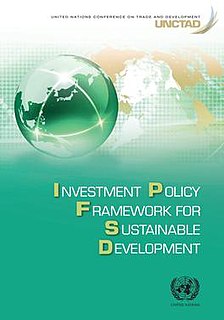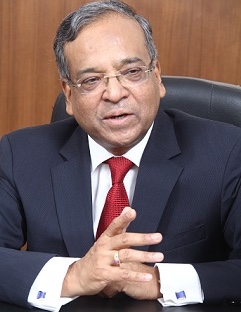Environmental protection is the practice of protecting the natural environment by individuals, organizations and governments. Its objectives are to conserve natural resources and the existing natural environment and, where possible, to repair damage and reverse trends.

The Confederation of Indian Industry (CII) is a business association in India.

The National Reconstruction Bureau of Pakistan was an independent and constitutionally established federal institution tasked with economic recovery and prosperous development through the local government system. It was dissolved in May 2011.
Procurement is the process of finding, acquiring, buying goods, services or works from an external source, often via a tendering or competitive bidding process. The process is used to ensure the buyer receives goods, services or works the best possible price, when aspects such as quality, quantity, time, and location are compared. Procurement is considered sustainable when organizations broadens this framework by meeting their needs for goods, services, works, and utilities in a way that achieves value for money and promotes positive outcomes not only for the organization itself but for the economy, environment, and society. This framework is also known as the triple bottom line.
The Ministry of Corporate Affairs is an Indian government ministry. It is primarily concerned with administration of the Companies Act 2013, the Companies Act 1956, the Limited Liability Partnership Act, 2008 & other allied Acts and rules & regulations framed there-under mainly for regulating the functioning of the corporate sector in accordance with law. It is responsible mainly for regulation of Indian enterprises in Industrial and Services sector. Ministry is mostly served by the Indian Corporate Law Service officers cadre (ICLS). These officers are being selected through Civil Services Examination Conducted by UPSC. Brilliant talent pool of the country serves MCA in different capacities. The highest post of DGCoA is being fixed at Apex Scale for the ICLS. The current minister of corporate affairs isNirmala Sitharaman. The current Minister of State for Corporate Affairs is Mr. Anurag Thakur.
The Ministry of Commerce and Industry administers two departments, the Department of Commerce and the Department for Promotion of Industry & Internal Trade. The head of the Ministry is a Minister of Cabinet rank.
The Ministry of Housing and Urban Poverty Alleviation is an agency of the Government of India responsible for urban poverty, housing, and employment programs. It is involved in national policy decisions and coordinates with Indian central ministries, state governments, and central sponsor programs. The organisation's minister, as of June 2014, is Venkaiah Naidu.

The United Nations Department of Economic and Social Affairs is part of the United Nations Secretariat and is responsible for the follow-up to major United Nations Summits and Conferences, as well as services to the United Nations Economic and Social Council and the Second and Third Committees of the United Nations General Assembly. UN DESA assists countries around the world in agenda-setting and decision-making with the goal of meeting their economic, social and environmental challenges. It supports international cooperation to promote sustainable development for all, having as a foundation the 2030 Agenda for Sustainable Development and the 17 Sustainable Development Goals (SDGs) as adopted by the UN General Assembly on 25 September 2015. In providing a broad range of analytical products, policy advice, and technical assistance, UN DESA effectively translates global commitments in the economic, social and environmental spheres into national policies and actions and continues to play a key role in monitoring progress towards internationally agreed-upon development goals. It is also a member of the United Nations Development Group.
The Ministry of Mines, a branch of the Government of India, is the apex body for formulation and administration of the rules and regulations and laws relating to mines in India. The head of the ministry is Pralhad Joshi since June 2019.
The economic liberalisation in India refers to the economic liberalisation, initiated in 1991, of the country's economic policies, with the goal of making the economy more market- and service-oriented, and expanding the role of private and foreign investment. Most of these changes were made as part of the conditions laid out by the World Bank and the IMF as a condition for a $500 million bail out to the Indian government in December 1991. Specific changes include a reduction in import tariffs, deregulation of markets, reduction of taxes, and greater foreign investment. Liberalisation has been credited by its proponents for the high economic growth recorded by the country in the 1990s and 2000s. Its opponents have blamed it for increased inequality and economic degradation. The overall direction of liberalisation has since remained the same, irrespective of the ruling party, although no party has yet solved a variety of politically difficult issues, such as liberalising labour laws and reducing agricultural subsidies. There exists a lively debate in India as to whether the economic reforms were sustainable and beneficial to the people of India as a whole.
The National Policy on Education (NPE) is a policy formulated by the Government of India to promote education amongst India's people. The policy covers elementary education to colleges in both rural and urban India. The first NPE was promulgated in 1968 by the government of Prime Minister Indira Gandhi, and the second by Prime Minister Rajiv Gandhi in 1986. The government of India has appointed a new committee under K. Kasturirangan to prepare a Draft for the new National Education Policy in 2017.
The textile industry in India traditionally, after agriculture, is the only industry that has generated huge employment for both skilled and unskilled labour in textiles. The textile industry continues to be the second-largest employment generating sector in India. It offers direct employment to over 35 million in the country. The share of textiles in total exports was 11.04% during April–July 2010, as per the Ministry of Textiles. During 2009–2010, the Indian textile industry was pegged at US$55 billion, 64% of which services domestic demand. In 2010, there were 2,500 textile weaving factories and 4,135 textile finishing factories in all of India. According to AT Kearney’s ‘Retail Apparel Index’, India was ranked as the fourth most promising market for apparel retailers in 2009.

Food Safety and Standards Authority of India (FSSAI) is an autonomous body established under the Ministry of Health & Family Welfare, Government of India. The FSSAI has been established under the Food Safety and Standards Act, 2006 which is a consolidating statute related to food safety and regulation in India. FSSAI is responsible for protecting and promoting public health through the regulation and supervision of food safety.

The Investment Policy Framework for Sustainable Development (IPFSD) is a dynamic document created to help governments formulate sound investment policy, especially international investment agreements (IIAs), that capitalize on foreign direct investment (FDI) for sustainable development. It was prepared by the Division on Investment and Enterprise (DIAE) of the United Nations Conference on Trade and Development (UNCTAD). IPFSD is not a negotiated text or undertaking between States; but rather an initiative by the UNCTAD Secretariat that represents expert guidance while leaving domestic policy makers free to adapt and adopt. IPFSD is the result of numerous consultations with experts and is intended as a platform to provide for further consultation and discussion with all investment stakeholders. The main objective of the IPFSD is to create a balance between the rights and obligations of States and investors while maintaining attractive investment environments.

India's National Voluntary Guidelines on Social, Environmental and Economic Responsibilities of Business (NVGs) were released by the Ministry of Corporate Affairs (MCA) in July 2011 by Mr. Murli Deora, the former Honourable Minister for Corporate Affairs. The national framework on Business Responsibility is essentially a set of nine principles that offer businesses an Indian understanding and approach to inculcating responsible business conduct.

The NITI Aayog is a policy think tank of the Government of India, established with the aim to achieve Sustainable Development Goals and to enhance cooperative federalism by fostering the involvement of State Governments of India in the economic policy-making process using a bottom-up approach. Its initiatives include "15 year road map", "7-year vision, strategy and action plan", AMRUT, Digital India, Atal Innovation Mission, Medical Education Reform, agriculture reforms, Indices Measuring States’ Performance in Health, Education and Water Management, Sub-Group of Chief Ministers on Rationalization of Centrally Sponsored Schemes, Sub-Group of Chief Ministers on Swachh Bharat Abhiyan, Sub-Group of Chief Ministers on Skill Development, Task Forces on Agriculture and op of Poverty, and Transforming India Lecture Series.

The Indian Revenue Service , often abbreviated to I.R.S. (I.T.), or simply IRS (IT), is the administrative revenue service of the Government of India. A Central Service, it functions under the Department of Revenue of the Ministry of Finance and is under the administrative direction of the Revenue Secretary and the ministerial command of the Minister of Finance. The IRS is primarily responsible for collecting and administering direct taxes accruing to the Government of India. It is one of the largest civil service amongst the organised civil services in the Indian government and serves the nation through discharging sovereign functions of collection of revenue for development, security and governance.









